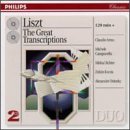| All Artists: Franz Liszt, Michele Campanella, Alexander Uninsky, Zoltán Kocsis, Misha Dichter, Claudio Arrau Title: Liszt: The Great Transcriptions Members Wishing: 1 Total Copies: 0 Label: Philips Release Date: 6/10/1997 Genres: Special Interest, Classical Style: Marches Number of Discs: 2 SwapaCD Credits: 2 UPC: 028945605227 |
Search - Franz Liszt, Michele Campanella, Alexander Uninsky :: Liszt: The Great Transcriptions
 | Franz Liszt, Michele Campanella, Alexander Uninsky Liszt: The Great Transcriptions Genres: Special Interest, Classical
|
Larger Image |
CD Details |
CD ReviewsLiszt's famous transcriptions and paraphrases Amy | 10/23/2007 (5 out of 5 stars) "Franz Liszt was a virtuoso pianist, an amazing composer and brought many innovations to classical piano music. He was the first to introduce the solo recital and provided more independence to musicians raising the artistic level of concert performances. Liszt brought even more freedom to pianists by creating a completely new piano technique that allowed playing fast and brilliantly at the same time. Transcriptions and paraphrases played a special role in Liszt's professional life. Unlike others pianists of his time, he never viewed transcriptions as tools for showing off his virtuoso abilities. Liszt transcribed works of others in order to promote music of not very well known composers to the public. In orchestral transcriptions he introduced new sound to reflect the contribution of many instruments. In transcriptions of songs Liszt aimed at preserving a vocal line while creating a self contained piano piece with rich accompaniment. In opera transcriptions he managed to describe characters and ideas in all their complexity based on just a small fragment of an opera. Liszt's works contain an astonishing number of piano transcriptions of works by other composers. Some of these are extremely faithful to the original. For example, Beethoven's Symphonies or Erlkonig from Schubert's Lieder. Others are more rhapsodic, taking themes from here and there in larger works and treating them to more or less free development like Verdi's Rigoletto. These pieces are referred to as paraphrases, and one of the most remarkable aspects of them is how they manage to sound like Liszt and the original composer at the same time. All the pieces in this 2 cd set are dramatic and passionate, full of virtuoso piano playing and theatrical atmosphere. This is one of my favorite Liszt cd's and if you like exciting piano playing and want to listen to Liszt's transcriptions and paraphrases I know you will enjoy this cd set."
|

 Track Listings (7) - Disc #1
Track Listings (7) - Disc #1